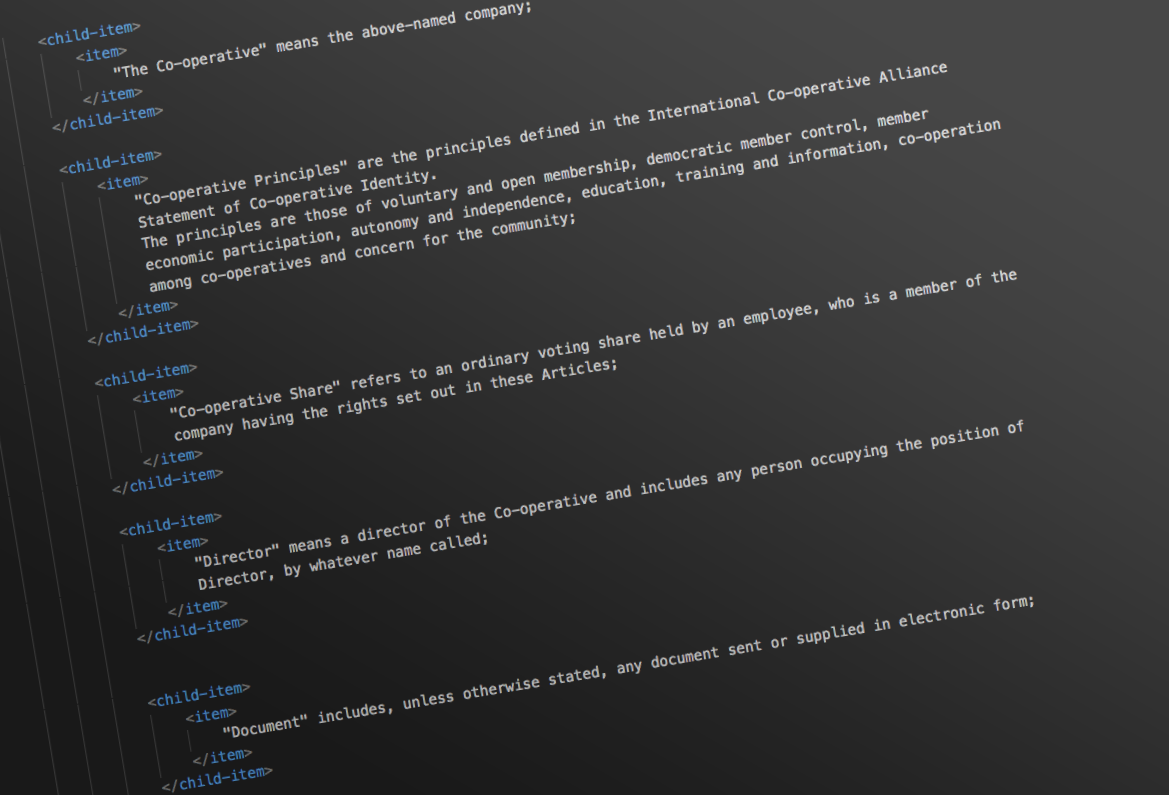It’s #CoopFortnight!
As we try and encourage more people to start new co-ops, there are many things to talk about … how your new co-op will be run, how it will benefit the workers and the community, how it can be a success … none of which we will talk about in this blog post!
Instead, we are going to talk about a boring but very important detail; Articles of Association. Every organisation (including co-ops) registered in the UK needs some Articles of Association - these are rules that set out how the organisation is run.
These are even more important for co-ops: they describe the structure of the organisation as a member-owned co-operative. They enshrine its co-operative nature and establish a protocol around governance and participation to ensure the co-operative stays member-owned in the future.
How we created our Articles of Association
At Open Data Services Co-operative, we created our articles like most others - we copied and pasted a template. But we ended up with some PDF’s, and then we had to make changes … at one point, one of our founders had to use a drawing package to do a photoshop-like edit to the text!
We know how important it is to track important bits of data, to track changes to that data and to make it easy to share data with people in a useful form - because that’s what we spend our working life doing for our clients. So we weren’t happy with how we were treating our own Articles of Association.
We want to make this easier, for us and for other co-ops!

It should be easy to have your co-op’s articles in a form that you can edit freely, both when you start and when you want to make changes later.
Co-ops UK provide many services to those wanting to start or convert to a co-op, including templates of various Articles of Association in PDF format.
PDFs are a great format for exchanging documents that don’t need to change, but they’re difficult to edit. We wanted to make the Articles of Association easier to use.
So we created a representation of the model articles in a data format called XML, and a small tool to turn the XML into a nice web page or PDF you can print off.
The process of creating the Articles of Association for your co-op is now easy:
- Copy the standard XML;
- Edit as needed (Co-ops UK can help with this);
- Copy and paste the XML into the tool to create a nice PDF you can download and print off;
- Make sure you save the XML for future edits (it a small and simple file that you can easily track changes in);
- Job done!
Well, we admit that XML might not be the easiest for non-technical people to edit! Unfortunately, we didn’t manage to work out a good solution to this - but maybe someone will.
FAQs
Why do I need to use XML?
We went with XML and a custom tool because getting the numbering right in legal documents is such a pain! (This seems to be universal - we even talked to someone in a legal firm who said they have an old copy of Microsoft Word they can’t update because they have so many plugins and hacks to make their numbering work.)
With this XML and custom tool, we can make sure that each time the numbering renders correctly and consistently.
Why can’t I use Markup?
Our first attempt involved using Markup, but we found out that when you have lists inside lists inside lists (as Articles of Association do) different renderers number the lists very differently, and so reluctantly we gave up on that.
How can I track changes in my articles?
Because the source file for your Articles of Association is now in XML, it’s easy for more technical co-ops to use Git to track the file, and to use pull requests to discuss any changes to it! Here are our articles, for instance.
So if you want to start a co-op …
Firstly; do contact Co-ops UK! They will be keen to help.
When it comes time to make your Articles of Association, we hope our tool will make the process super simple for you! Check out the git hub repository which has instructions for use.
And from one co-op to another, good luck! :-)
